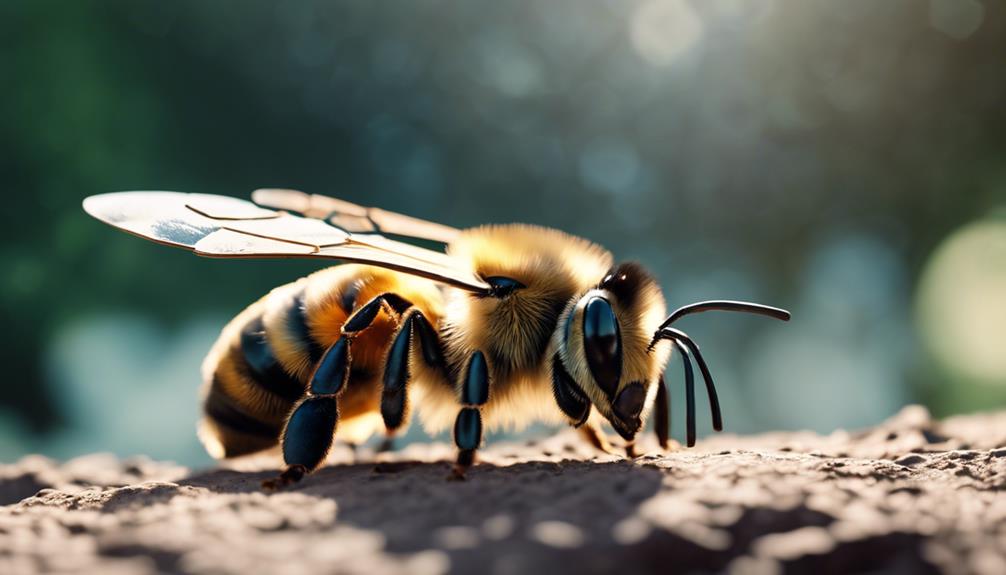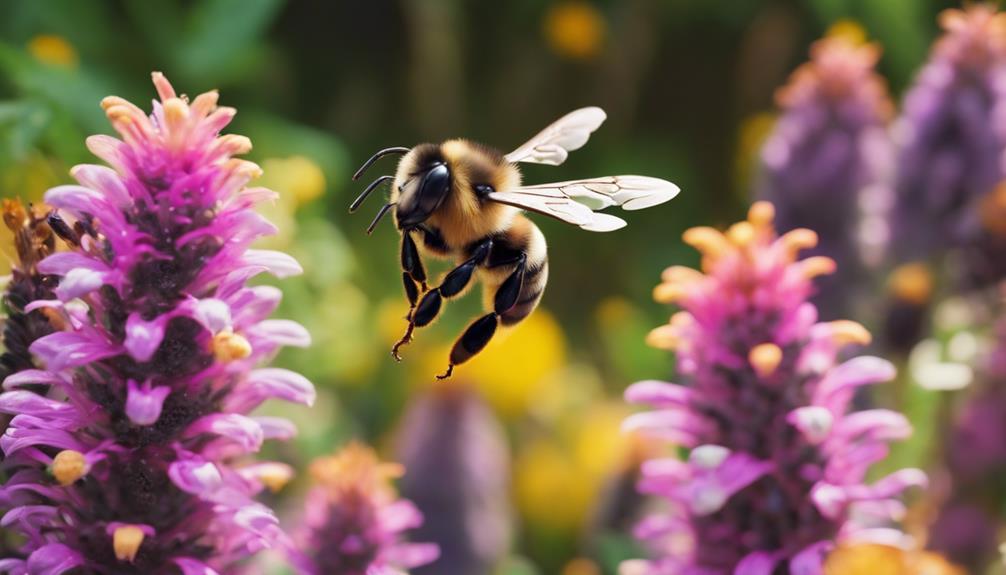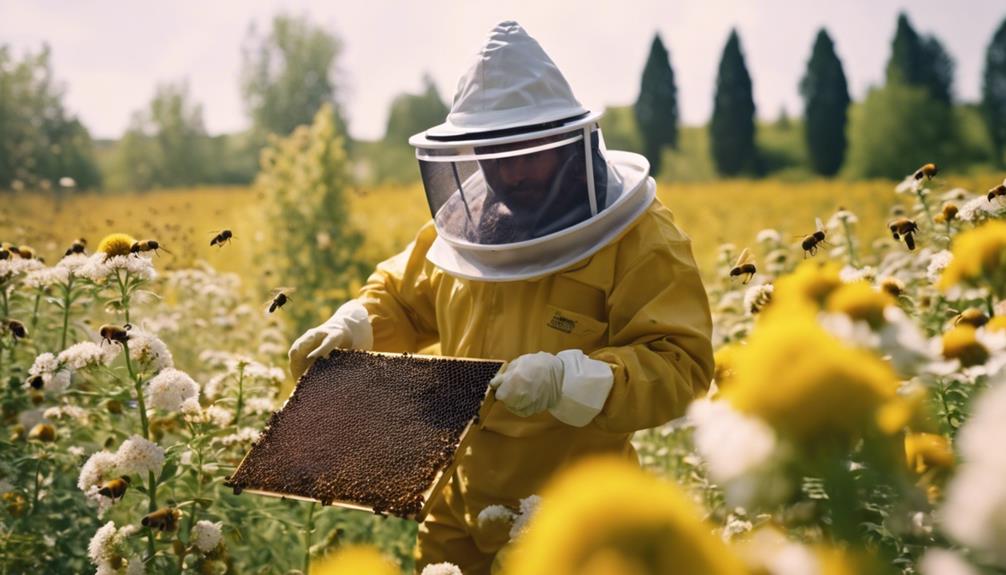We learned that bees don’t hate smoke; in fact, beekeepers use it to calm them. However, in regard to cigarette smoke, it’s a different story. Cigarette smoke can disrupt bees’ sense of smell and communication, making them agitated and disoriented. The nicotine and toxins in cigarette smoke can also harm bee health, so it’s essential to keep it away from beehives to protect our buzzing friends. If you want to know more about how smoke affects bees and the importance of beekeeper’s smoke, keep exploring the fascinating world of bees and their well-being.
Main Points
- Cigarette smoke disrupts bees’ sense of smell and communication.
- Bees can become agitated and disoriented when exposed to cigarette smoke.
- Nicotine and toxins in cigarette smoke harm bee health.
- Beekeepers should avoid exposing bees to cigarette smoke.
- Prioritizing bee well-being includes keeping cigarette smoke away from beehives.
Bee Behavior and Cigarette Smoke
When bees encounter cigarette smoke, they exhibit behavioral changes due to the disruptive nature of its scent on their communication and foraging activities. The smell of cigarette smoke can throw off their intricate ways of talking to each other, making it harder for them to coordinate their efforts in finding nectar and pollen.
It’s like trying to have a conversation in a noisy room – frustrating and inefficient. Bees rely on clear communication to thrive, so any disruption, like cigarette smoke, can really throw them off their game.
Imagine trying to find your favorite food with a strong, unpleasant smell distracting you at every turn. That’s what it’s like for bees when they come across cigarette smoke – a real buzzkill for these hardworking pollinators.
Impact of Smoke on Bees
In regards to bees and smoke, it’s all about the impact it has on these hardworking insects. Surprisingly, smoke can disrupt bees’ communication and even soothe them during hive inspections.
Bee Behavior and Smoke
Using smoke around bees impacts their behavior by interfering with their sense of smell and communication within the colony. Here are some key points to take into account:
- Smoke reduces bees’ sensitivity to alarm pheromones.
- Strong floral odors have a calming effect on bees similar to smoke during hive inspections.
- The effects of smoke on bees are reversible within 10-20 minutes.
- Bees return to normal behavior after exposure to smoke.
- Professional beekeepers find smoke a cost-effective and reliable method to calm bees without causing long-lasting harm.
Understanding how smoke affects honey bees can help beekeepers manage their colonies effectively while respecting the bees’ natural behavior.
Smoke Effects on Bees
Cigarette smoke has been proven to have a calming effect on bees during hive inspections. Smoke affects bees’ sense of smell, making it harder for them to communicate and detect danger signals. When bees sense smoke, they go into a mode where they’re less likely to attack, preparing to leave the hive and focus on consuming honey instead. Beekeepers use smoke during hive inspections to prevent bees from getting defensive and to keep them calm.
Surprisingly, strong floral scents can also have a calming impact on bees during these checks. The effects of smoke wear off within 10-20 minutes, and it doesn’t cause lasting harm to the bees.
Beekeepers Use of Smoke
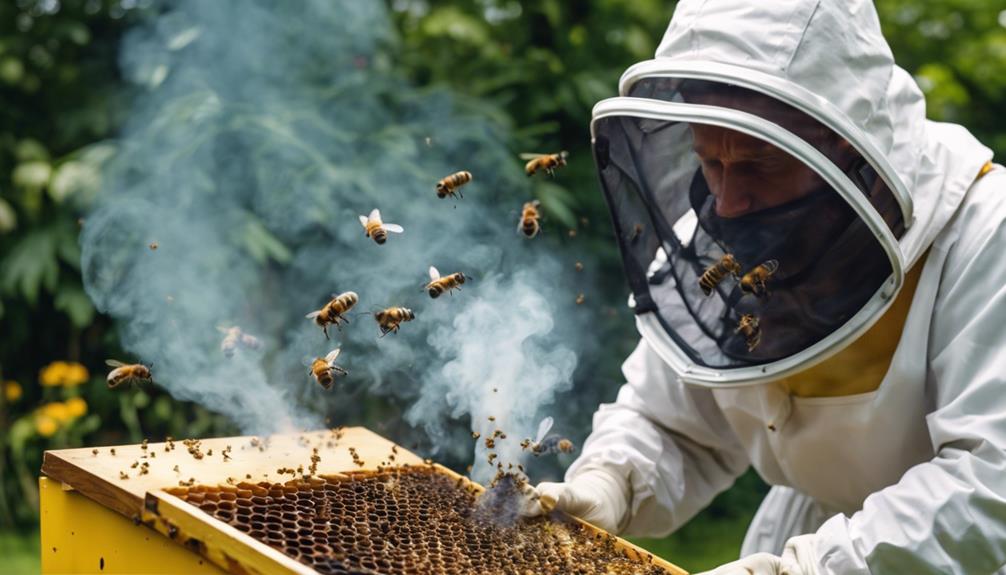
Beekeepers rely on smoke to calm bees during hive inspections by disrupting their sense of smell. Smoke interferes with bees’ communication, preventing the spread of alarm pheromones and reducing the chances of triggering defensive responses. Here are some reasons why beekeepers choose to use smoke:
- Smoke disrupts bees’ communication within the hive.
- It prevents the spread of alarm pheromones.
- Smoke is cost-effective and reliable for calming bees.
- Helps beekeepers avoid triggering defensive responses.
- Traditional practice with proven calming effects on bees.
Even though bees release isopentyl acetate when alarmed, the smoke’s masking effect helps maintain a peaceful hive environment for inspection.
Smoking Bees for Hive Maintenance
When maintaining beehives, it’s crucial to utilize a bee smoker with appropriate fuels for calming bees without causing harm. A bee smoker, when used correctly, can help keep bees calm and focused during hive inspections. It’s like offering them a soothing aromatherapy session to ease any tension and prevent unnecessary buzzing around.
The smoke from the bee smoker works wonders in masking any alarm signals that might trigger the bees to become defensive. By gently puffing some smoke, we create a chill atmosphere in the hive, making it easier for us to do our maintenance work peacefully. Remember, happy bees make for a happy hive, and a bee smoker is our trusty tool in achieving that harmony.
Bees Response to Smoke
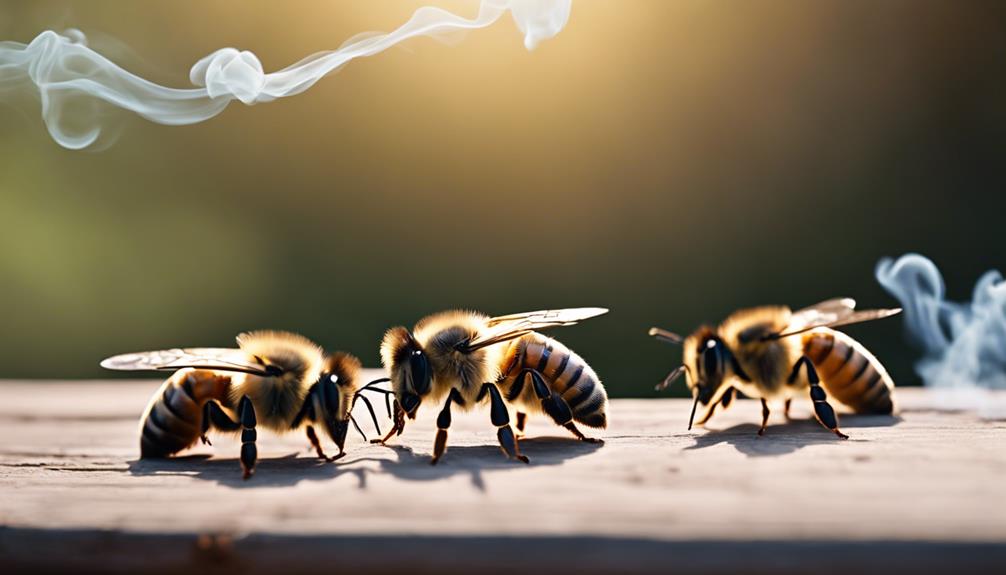
When bees encounter smoke, their behavior changes significantly.
The smoke has a vital effect on bees, making them less agitated and defensive.
This altered response to smoke is essential for beekeepers when handling hives to guarantee both the bees’ well-being and the efficiency of the work.
Smoke Calms Bees
In the presence of gentle, cool smoke, bees exhibit a noticeable calming response during hive inspections. Bees are sensitive creatures, and the right kind of smoke can help keep them relaxed and cooperative. Here are some key points to remember about how smoke calms bees:
- Cool smoke from bee smokers is designed to soothe bees, unlike the hot, toxic smoke from cigarettes.
- The gentle smoke interferes with the bees’ pheromones, making them less aggressive.
- Smoke masks alarm pheromones released by guard bees, preventing other bees from becoming defensive.
- It triggers a feeding response in bees, distracting them and reducing the likelihood of stinging.
- The calming effect allows beekeepers to work more effectively and safely within the hive.
Impact on Behavior
Bees demonstrate varied behavioral responses to different types of smoke, highlighting the importance of using beekeeper’s smoke over cigarette smoke for hive management.
While beekeeper’s smoke has a vital effect on bees, cigarette smoke can agitate them, triggering defensive behaviors. The harsh chemicals and toxins in cigarette smoke can harm bees and disrupt their normal activities, stressing the hive.
As responsible beekeepers, it’s essential to prioritize the well-being of our bees by avoiding the use of cigarette smoke near hives. Opting for beekeeper’s smoke not only guarantees a more peaceful environment for the bees but also supports effective hive management practices.
Cigarette Smoke and Bee Health
Exposure to cigarette smoke poses a threat to the health and well-being of bees due to its disruptive effects on their sensory functions. When bees encounter cigarette smoke, it can harm their sense of smell, leading to disorientation and agitation. The nicotine and other toxins in the smoke can have negative impacts on bee health, affecting their ability to communicate and navigate effectively. Beekeepers should steer clear of exposing bees to cigarette smoke to prevent any adverse reactions and maintain the overall health of the hives. Keeping cigarette smoke away from beehives is vital for ensuring the bees’ well-being.
- Cigarette smoke disrupts bees’ sense of smell and communication.
- Bees can become disoriented and agitated when exposed to cigarette smoke.
- Nicotine and toxins in cigarette smoke harm bee health.
- Beekeepers should avoid exposing bees to cigarette smoke.
- Keeping cigarette smoke away from beehives is essential for bee health.
Smoking Techniques for Bee Care
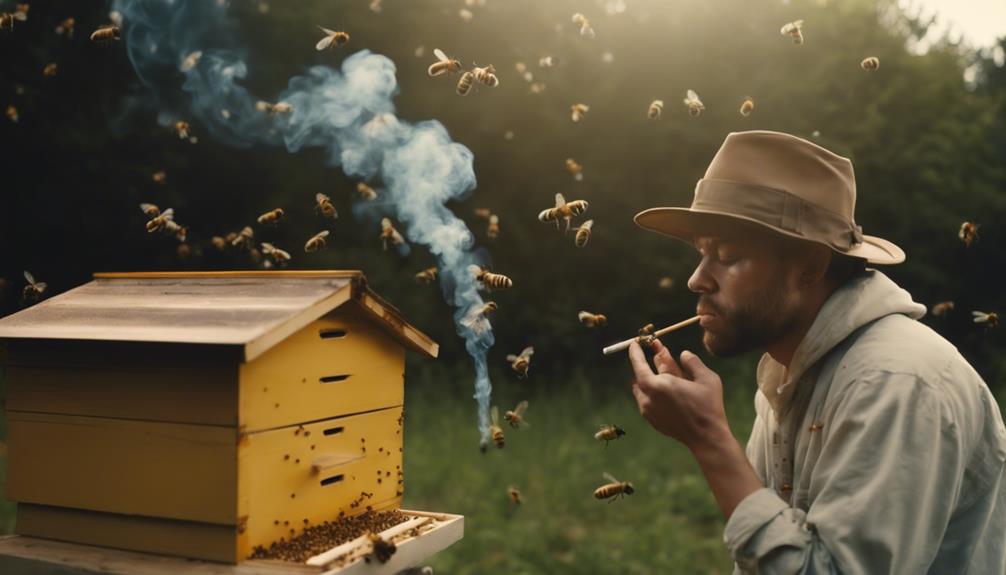
Utilizing smoking techniques is a common practice among beekeepers to help calm bees during hive inspections. When we approach a hive, a gentle puff of smoke at the entrance signals to the bees that we mean no harm. This smoke interferes with their alarm pheromones, reducing their defensive response and allowing us to work peacefully.
Proper smoking techniques involve a delicate balance – too much smoke can stress the bees, while too little mightn’t be effective. As beekeepers, we aim to handle our buzzing friends with care, using smoke as a tool to guarantee both their well-being and ours.
These smoking techniques aren’t just about safety; they’re about fostering a harmonious relationship between us and our essential pollinators.
Smoke as a Beekeeping Tool
When tending to hives, employing smoke as a calming agent is a fundamental practice among beekeepers. Here are five reasons why smoke is used as a beekeeping tool:
- Interferes with bees’ sense of smell: Smoke disrupts bees’ ability to detect alarm pheromones.
- Masks alarm pheromones: The smoke from a bee smoker covers up the signals that trigger aggression in bees.
- Disrupts communication: By using smoke, beekeepers can prevent bees from coordinating attacks.
- Redirects bees’ focus: Smoke temporarily alters bees’ behavior, making them more interested in consuming honey than stinging.
- Cost-effective and reliable: Professional beekeepers trust smoke as a safe and efficient method to handle hives.
Smoke and Bee Pollination
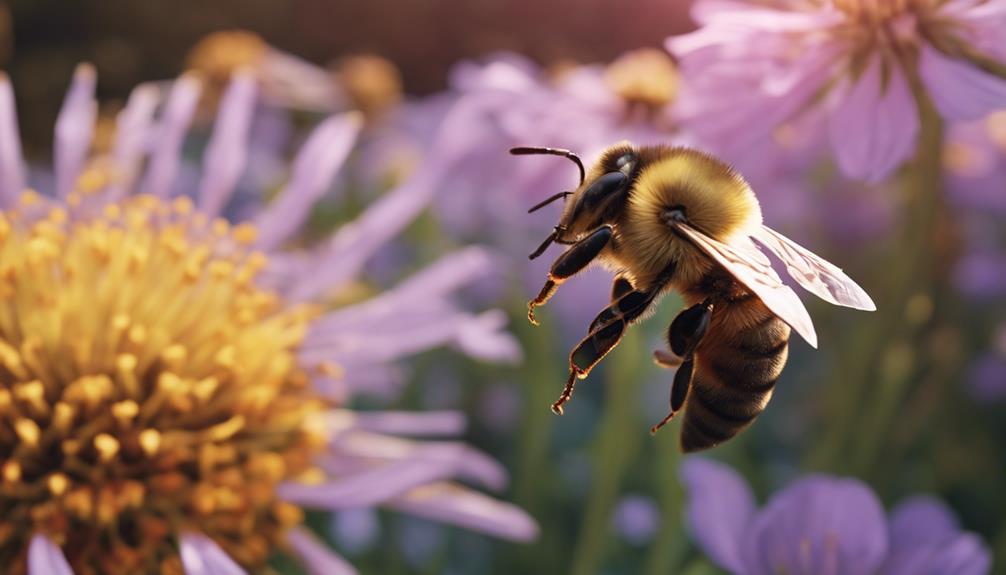
During bee pollination, cigarette smoke lacks the essential effects that beekeepers’ smoke has on bees. Bees aren’t deterred by cigarette smoke, as it doesn’t disrupt their communication or behavior.
Unlike the soothing effect of beekeeper’s smoke, cigarette smoke doesn’t assist in keeping bees calm during pollination. It’s important to prioritize the well-being of bees by avoiding exposure to harmful smoke, including cigarette smoke, to safeguard successful pollination.
Beekeepers rely on specialized smokers, not cigarette smoke, to manage bees effectively without causing harm. Understanding the impact of different types of smoke on bees helps maintain a harmonious environment for pollination.

Hello! My name is Noel Calvin. I graduated from UCLA and now work as a writer at Launch Ninjas. I write blog posts that inspire and guide our readers in their entrepreneurial pursuits. I live in Pleasantville, NJ, with a peaceful yet lively atmosphere that inspires me.
Writing stories is more than just a job for me. It allows me to share my observations and satisfy my curiosity about the world. I combine my analytical skills with creative enthusiasm to delve into technology trends and startup stories. But my life isn’t limited to screens and keyboards. I value loyalty, passion, and a touch of old-fashioned charm, which I infuse into every narrative I create.
I love spending time in my garage, jamming with my band when I’m not writing. Playing the guitar and singing bring me immense joy. I also enjoy capturing ordinary and extraordinary moments through my camera lens and exploring new culinary adventures that excite my taste buds. I’m always seeking new experiences.
My family is very important to me. Joyful Sunday brunches filled with laughter and intense board game nights keep me grounded, reminding me of life’s simple pleasures.
In my world, every moment is an opportunity for discovery. Every discovery is a story worth sharing, whether a heartfelt moment at home or the pulse of technological innovations. Join me as I navigate through life, one blog post, one guitar strum, and one heartwarming family dinner at a time.
